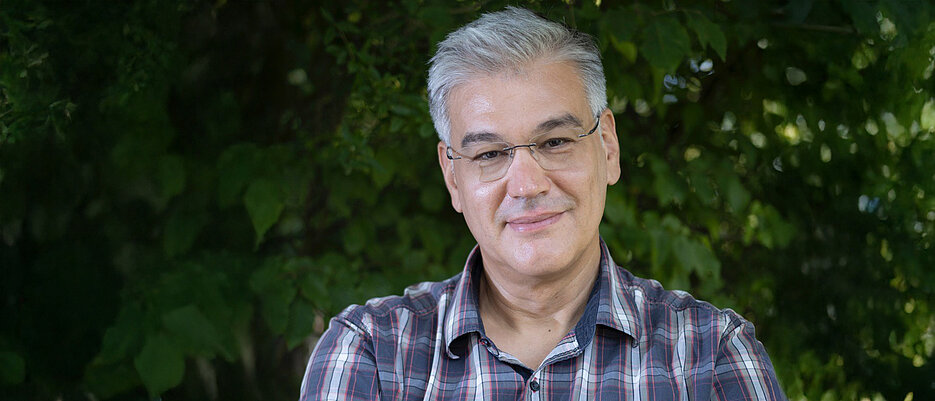Plant Hormones: How They Get Through Cell Membranes
10/21/2025Healthy growth of wheat, maize and other crops is not possible without the plant's own hormones. Professor Ulrich Hammes is investigating the proteins that help the hormones reach their sites of action.

Plants cannot walk. That's why they must organise their lives as well as possible where they grow. They have to ensure that enough light falls on their leaves, that their roots find water in the soil and much more. All these vital processes are controlled by hormones.
For example, there is the hormone auxin. If light direction changes, it moves from the leaves to the stems. There it ensures that the plant shoots bend in the direction in which they receive optimal light conditions. This effect can be observed very well on houseplants on the windowsill.
Transport Proteins as Gateways for Molecules
How do plants manage to transport hormones, sugars and other molecules from cell to cell? How does transport over longer distances, for example from the leaves to the roots, work? Professor Ulrich Hammes, the new head of the Department of Botany I at the University of Würzburg, is interested in these questions.
His research centres on the transport proteins that reside in the cell membranes of plants. "We are trying to understand the function and structure of these transporters down to the atomic detail," says the new professor.
Focus on Disordered Protein Sections
There is plenty to do in this field: "Three to five per cent of the plant's genes consists of building instructions for transport proteins. But we don't even know the function of 20 % of these proteins yet," explains Ulrich Hammes.
The botanist sees the structure-free, disordered areas of the transport proteins as a particular challenge. In these areas, the long amino acid chains that make up proteins are neither folded nor spirally wound nor structured in any other way. They look more like threads: "This is where the functions of the proteins are often regulated and highly dynamic, but we are not yet able to get a satisfactory picture of these areas."
Member of the Plant-PATH Centre of Excellence
When a doctor needs a picture of broken bones, she takes an X-ray. If a botanist wants an image of membrane proteins, he must use more complex techniques such as cryo-electron microscopy.
The experts for this technique, with whom Ulrich Hammes co-operates, are based in Denmark. Together with them and a Belgian group, the Würzburg researcher is a member of the Plant-PATH Centre of Excellence, which is funded by the Danish National Research Foundation. The centre is researching the role that plant hormones play in the adaptation of plants to climate change.
One of the group's most recent successes: in 2022, it elucidated the structure of the central auxin transporter PIN8 and published it in the top journal Nature. They have also characterised the transporter biochemically and biophysically and described how it works.
Research for Better Agriculture
What is this kind of research good for? Professor Hammes is constantly providing new pieces of the mosaic which, together with the contributions of other research groups, could ultimately provide an important picture: A picture of how plants deal with heat, drought and other stress factors. And with its help, new varieties of food plants can be bred that can withstand a wide range of problems and still deliver good yields.
Curriculum Vitae of the New Professor
Ulrich Hammes, born in 1973, grew up in the Stuttgart area. He studied biology at the University of Tübingen, where he also gained his doctorate.
He completed further stages of his scientific career at the Donald Danforth Plant Science Centre in St. Louis (USA) and at the Universities of Erlangen-Nuremberg and Regensburg.
From 2017, Ulrich Hammes conducted research at the Chair of Systems Biology of Plants at the Technical University of Munich. From there, he moved to the University of Würzburg in October 2025 as Head of the Chair of Botany I - Molecular Plant Physiology and Biophysics.
Contact
Prof Dr Ulrich Hammes, University of Würzburg, T +49 931 31-88849, ulrich.hammes@uni-wuerzburg.de







